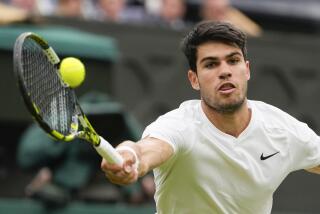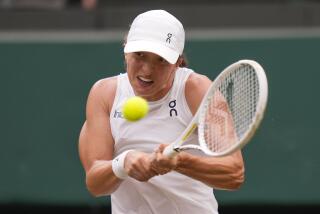Parents Can Say Dumbest Things
- Share via
WIMBLEDON, England — Once again at a tennis tournament a teenage girl sat on a podium, took a deep breath and got ready to answer for the ill-considered actions of a parent.
Alexandra Stevenson, a charming 18-year-old who is willing to burst into song on request and who giggled and eagerly spoke of her roles in such high school musical productions as “The Wizard of Oz” and “Guys and Dolls,” has advanced through the Wimbledon qualifier and into the quarterfinals.
It has been her dream, Stevenson said Wednesday after knocking out Lisa Raymond, 2-6, 7-6 (10-8), 6-1, in a fourth-round match, to do this. “Remember,” Stevenson said, “when John McEnroe qualified into the quarters? [Actually, the semifinals, in 1977.] Well, I’ve known about that my whole life, and I’m very excited to do the exact same thing he did.”
But that tennis accomplishment has disappeared for Stevenson. Instead, she sat up straight, looked questioners in the eyes, was polite, was firm and was forced to speak for her mother, Samantha.
Samantha Stevenson, a freelance writer for the New York Times and other publications, made some intemperate statements over the weekend about alleged racism her daughter has faced and about her own perceptions of and unhappiness with lesbians on the WTA Tour.
Then on Wednesday, a newspaper reported a story that had been rumored for several years. Samantha Stevenson is white and her daughter’s father is black, though neither mother nor daughter has wanted to speak about the father. He has never come forward. The Fort Lauderdale Sun Sentinel reported that the name of Julius Winfield Erving II is on Alexandra’s birth certificate. Erving, the former Philadelphia 76er Hall of Famer, denied to the newspaper that he is the father. Samantha refused comment.
In the past, Samantha and Alexandra have said the father is not and never has been a part of their life. And no one seemed to care about finding out this deep family secret until Alexandra arrived at Wimbledon and began to play well.
So there sat Alexandra, alone and smiling. First, she said, she wanted to read a statement. In it, Alexandra defended her mother’s weekend remarks. “My mother,” she said, “merely expressed our family’s view of life, and she’s right. Life on tour is quite tough.” Alexandra said that London tabloids had twisted Samantha’s words. “I think it’s a shame some of the more sensational English newspapers reported their comments inaccurately,” she said.
In her prepared statement, Alexandra made no reference to the story about her father. When asked, three times, she said, “No comment.”
These were uncomfortable exchanges. And so uncomfortably reminiscent of so many other teenagers.
Too many times Steffi Graf sat at Wimbledon, near tears, while she was grilled about some horrible misdeeds of her father, Peter. Was it true Peter impregnated a magazine model? Was it true Peter used her, Steffi, to get dates for him? Was it true Peter was a tax cheat? Peter never stood up and answered.
And there has been Richard Williams, father of star sisters Venus and Serena, making comments about racial slights against his daughters but never with specifics or details and always on the run. A day later Venus or Serena wins a match and nobody cares about the tennis, only about what Dad has said. Dad, of course, is now unavailable.
It has happened this way with Mary Pierce and with the newest young sensation, Jelena Dokic, the 16-year-old and also a qualifier, who will play Stevenson today in the quarterfinals. Dad makes a fool of himself, getting banned from tournaments or arrested at tournaments, and daughter is left to face the questions.
Alexandra refused to have the smile whacked from her face Wednesday. Not even at the Wimbledon qualifying event at Roehampton, where the teenager acknowledged being the subject of a racial epithet while in junior competition: “When you think about it, there’s racism everywhere in the world.”
As Alexandra spoke, Samantha huddled in the back of the room. When her daughter left the interview area, the mother would only say “no comment” to questioners. It was the mother who seemed helpless and befuddled. And it should be the mother who shuts up from now on. By making herself the center of attention with her words on racism and lesbianism, Samantha also made herself too big a target, played into the hands of a reporter looking for a scoop to go hunting for a father in a family that has lived happily without speaking to the public about that part of its life.
As a journalist, Samantha Stevenson should have known what happens to targets. As a mother, she should have stood and answered the same questions her daughter faced. And for the rest of us, let’s hope that Stevenson is allowed to enjoy what is left of her improbable Wimbledon journey.
Diane Pucin can be reached at her e-mail address: diane.pucin@latimes.com.
WIMBLEDON
WILLIAMS PREVAILS: After a slow start, Venus Williams silenced Anna Kournikova and her vocal fans. Page 10
BYE-BYE, BECKER: Boris Becker’s latest Wimbledon comeback ended with a loss to Patrick Rafter. Page 10
More to Read
Go beyond the scoreboard
Get the latest on L.A.'s teams in the daily Sports Report newsletter.
You may occasionally receive promotional content from the Los Angeles Times.










